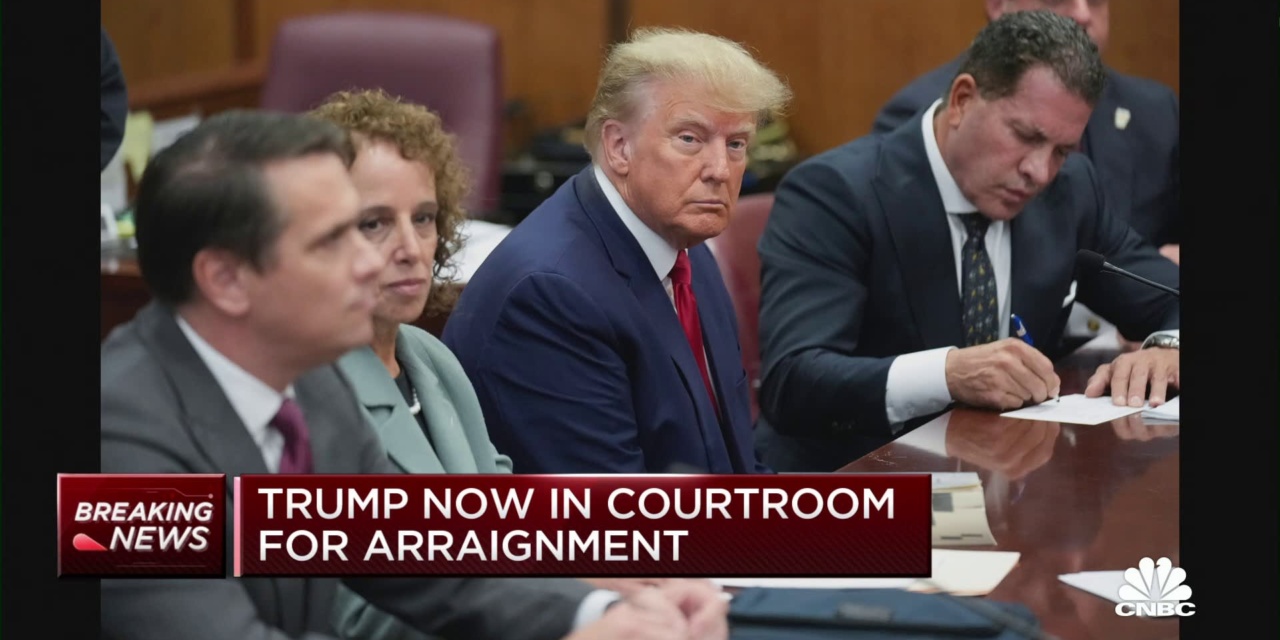Donald Trump was arraigned on Wednesday in a Manhattan courtroom on 34 felony counts of falsifying business records to cover up another possible crime.
A subdued Trump pleaded Not Guilty and returned to the sanctuary of his home and resort in Florida. There he gave a 25-minute speech attacking Manhattan District Attorney Alvin Bragg, Judge Juan Merchan, the judge’s wife, the judge’s daughter, and almost anyone else connect with his case.
In the 16-page indictment and a 13-page statement of facts, the prosecution set out the charges, each of which carried a prison sentence of 1 to 4 years.
The individual charges all stem from Trump’s reimbursement — from Trump Organization funds — of his lawyer and fixer Michael Cohen for a $130,000 payoff to adult film star Stormy Daniels in October 2016, days before the Presidential election.
But the falsification of business records is linked to the cover-up of another intended through the claim that Trump “orchestrated a scheme with others to influence the 2016 presidential election by identifying and purchasing negative information about him to suppress its publication and benefit the Defendant’s electoral prospects”.
According to prosecutors, that scheme also included a $150,000 payoff to former Playboy model Karen McDougal, who said she had a 10-month affair with Trump in 2006-2007, and a $30,000 payment to a former Trump Tower doorman who alleged that Trump had a child out of wedlock.
Prosecutors say that the multiple payoffs violated both New York State and federal election laws as de facto campaign contributions trying to ensure Trump’s victory.
The Falsification of the Trump Organization Records
Daniels was paid to remain silent about her sexual encounters in 2006 with Trump, 18 months after his marriage to Melania Knauss and four months after the birth of their son Barron.
The “hush money” was triggered by the release of a video on October 7, 2002 in which Trump bragged to Access Hollywood host Billy Bush about sexually accosting women. In late October, Cohen — acting on a plan, agreed two months after Trump declared his Presidential run in June 2015, to suppress any information about the candidate’s sexual affairs — made the payment.
Trump then approved a reimbursement for Cohen from Trump Organization accounts of $420,000, in the guise of “legal expenses”. The arrangement covered the $130,000 payoff plus $50,000 for Cohen’s work on another matter. The total was doubled to $360,000 so the fixer could pay 50% income tax. A $60,000 bonus was added.
The reimbursement was paid out in 11 monthly installments from February 2017 through the end of the year. The 34 felony counts cover Trump’s 11 checks, Cohen’s 11 invoices, and 12 entries in the Trump Organization’s books.
The Wider Scheme
The prosecutors’ allegations of illegal election interference stem from the August 2015 meeting in Trump Tower between Trump, Cohen, and David Pecker, the CEO of American Media Inc. and publisher of the National Enquirer tabloid.
Pecker would act as the “eyes and ears” for the campaign by looking out for negative stories about [Trump] and alerting [Cohen] Lawyer A before the stories were published. The AMI CEO also agreed to publish negative stories about the Defendant’s competitors for the election.
Pecker would oversee a “catch and kill” operation, in which he would buy the rights to the stories about Trump and then ensure that they were never published.
He made the first payment in autumn 2015 to the former Trump Tower doorman who alleged Trump had a child from an affair. The story was later established to be false.
In June 2016, Pecker contacted Cohen about Karen McDougal, who had approached the National Enquirer with the account of her 10-month affair with Trump. AMI paid McDougal the $150,000 for “two magazine cover features…and a series of articles that would be published under her byline”, in exchange for her agreement not to speak. publicly. None of the articles ever appeared.
Trump was directly involved in the arrangement. He asked Cohen, “So what do we got to pay for this? One fifty?”, and suggested paying by cash: “When [Cohen] disagreed, [Trump] then mentioned payment by check.”
On October 10, three days after the release of the damaging Access Hollywood video, Pecker connected Cohen with Stormy Daniels’ attorney. Cohen quickly negotiated a deal for Daniels’ silence before the election.
Trump tried to stall on the deal, instructing Cohen that if they could delay the payment until after thw election, they could avoid paying altogether, because at that point it would not matter if the story became public.
But with concern rising about a public, last-minute statement by Daniels before the vote, Trump agreed to the payoff. Trump “would not make the payment himself”. Instead, he agreed that Cohen would do so and would be reimbursed for the $130,000.
Cohen then opened a bank account in Manhattan to transfer the money on October 27, 11 days before the election.

